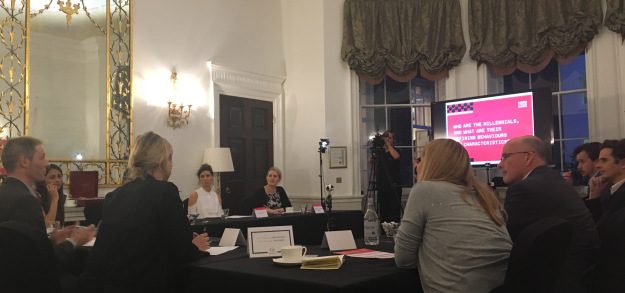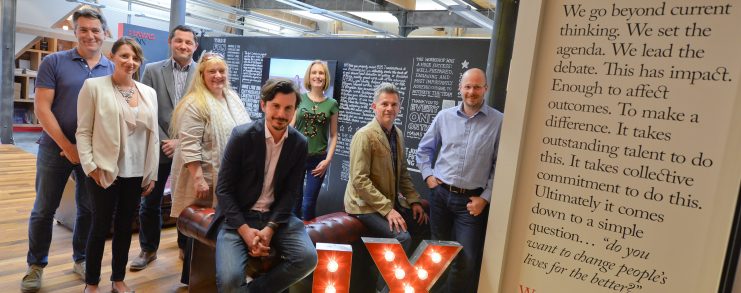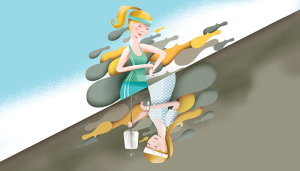Generation Now – Round Table Event
When we started our journey into Generation Now I had no idea how much interest it would generate and how it would develop a life all of its own. Generation Now puts the millennial healthcare professional under the spotlight and never more so than at our most recent event – a round table meeting of key millennial healthcare professionals, at the Royal Society of Medicine.
We were delighted to be joined by some of the industry’s top healthcare entrepreneurs and millennials. Between them Dr Shafi Ahmed, Dr Stephanie Eltz and Dr Matt Jameson Evans represent some of the most innovative faces of healthcare in the twenty-first century. Dr Ahmed, consultant general and colorectal surgeon, is a leader in the use and development of augmented reality in clinical practice in areas such as sharing the latest surgical techniques through live streaming oncology operations[i]; Dr Eltz is a trauma and orthopaedic registrar and founder of Doctify – a platform-neutral online patient-doctor interface and Dr Jameson Evans, previously an orthopaedic surgeon, is the co-founder and chief medical officer of HealthUnlocked – an online community that is gaining a reputation for being the LinkedIn for patients with chronic conditions. We also had key leaders from the pharmaceutical industry and the ABPI.
The round table discussion was lively – as you’d expect with such big personalities in the room. Entrepreneurs by nature are generally outgoing and yes sometimes outspoken – but then the point of the evening was to try and discover what the millennial generation could expect from healthcare, and what we could all be doing to help it get there.
Big data came up and, not unexpectedly, but maybe not quite fairly, the NHS’s apparent struggle to cope with it. Perhaps the recent involvement in healthcare of big data big guns such as Google and Facebook can help it find its place in healthcare. ‘Wearables’ were also seen as one of the next big things. Continuous blood glucose monitors are already ‘a thing’ but imagine the possibilities for 24/7 monitoring of health predictors and the benefits that this could bring to people with other chronic conditions. And where do I even begin with the possibilities that virtual and augmented reality could bring?
We may all be used to viewing healthcare as an immovable object, but everyone in the room was in agreement that much of the technology, either under development or already available to support the millennial HCP, will disrupt this status quo. As an industry we have so much to offer the millennial HCP and help them become positive disruptors, that can take new technology into healthcare for the benefit of all of us. One thing is clear – the future is most definitely coming, and with it huge steps in our understanding of patients, diseases and treatment.
While there were far too many great points made throughout the course of this event to talk about here, there are a few key things that really stuck in my mind. It’s clear that we all need to increase collaboration to encourage the uptake of these innovative technologies. We need to stop thinking we have to maintain the status quo – our entrepreneurial HCPs are delivering some amazing new approaches and, if we really embrace them, they have the potential to add enormous value to the way our healthcare system works. Probably the most important point though, was that while innovation should be welcomed, we must remember not to leave people behind. After all it is the millennial healthcare professionals and millennial patients that make our health service what it is; and what it will become.
Thank you to everyone who made this such an exciting and insightful debate.
Participants involved include:
Dr Shafi Ahmed, Consultant and Surgeon, and Co-founder of Medical Realities
Dr Stephanie Eltz, Founder of Doctify
David Hunt, CEO Havas Lynx
Dr Matt Jameson Evans, Co-founder and Chief Medical Officer of HealthUnlocked
Dr Rebecca Lumsden, Head of Science Policy, ABPI
John McCarthy, Vice President, Global Commercial Excellence, AstraZeneca
Dr Claire Novorol, Founder and Chief Medical Officer of Ada, Founder and Chairman of Doctorpreneurs
Sarah Price, Senior Planner, Havas Lynx
Hiba Saleem, Partnerships Director of Doctorpreneurs and CO-founder of Medtech Student Network
Dominic Tyer, Editorial Director, PMGroup and Chair
The Generation Now Round Table event will be featured in the November edition of PME, available online from 8th November 2016.
[i] http://www.wired.co.uk/article/wired-health-virtual-reality-surgery-shafi-ahmed




